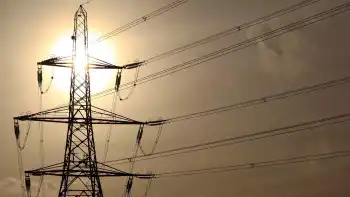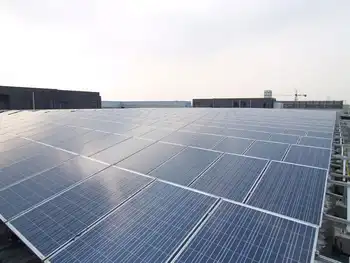Entrepreneurs hope to mix energy — and profits
By Charlotte Observer
Substation Relay Protection Training
Our customized live online or in‑person group training can be delivered to your staff at your location.

- Live Online
- 12 hours Instructor-led
- Group Training Available
"What it takes," he said, "is someone who loves the outdoors and likes to get wet. You get wet about every day."
Beaver-gnawed sticks float down the Lower Little River northeast of Hickory and wrap around Haneline's circa-1919 turbines, the guts of a plant he bought three years ago. "You can literally see the kilowatts fall," he said, sniffling after a recent repair.
As owner, operator and chief mechanic, he dons waders, descends into a room below the dam that leaks water with the force of a fire hose, and sets to work. Cleared of debris, the turbines whirl again and pollution-free electricity races off to Duke Energy's lines.
The Charlotte Observer reported that Haneline is among a rising number of North Carolina entrepreneurs hoping to wrestle energy — and profits — from the sun, wind, water and organic wastes. Their output, called renewable energy, is still so small that it's barely measurable against the coal- and nuclear-fueled power that dominate the state.
But they have reason for optimism — and investment.
A recent law dictates a growing role for renewables in the state's energy mix, beginning next year. Generous tax credits salve the sting of investing in expensive technology. And an energy-focused president believes he can help heal the economy by developing alternatives to fossil fuels.
It's fertile ground for tinkerers chasing the next great idea.
That describes Richard and Jerry Tucker, brothers and engineers who live in Locust, 20 miles northeast of Charlotte. The Tuckers have patented a device that superheats landfill garbage, producing methane gas and carbon in a process that they say emits no pollutants.
Four-foot flames, fueled by methane, shot into the night air recently as they demonstrated their invention for potential customers and investors. The methane could generate electricity or heat homes or boilers, the Tuckers say.
"What we produce is, in a sense, a transition fuel," Jerry Tucker said. "It's a transition between foreign oil and solar, wind, hydro and geothermal energy."
Like the Tuckers, most renewable-energy firms are small, according to a recent survey by the N.C. Sustainable Energy Association.
"We get a lot of folks saying, 'I've got a great idea that I built in my garage,'" said Paul Quinlan, the advocacy group's research and development director. "Some will work and some won't."
Businesses that turn algae into engine fuel and hog manure into electricity were among the first to win grants last year from the N.C. Green Business Fund.
The state-created pool of money encourages promising technologies with grants of up to $100,000. Nearly 300 grant requests poured in this year.
Homeowners are also becoming energy producers.
More than 200 owners of solar-power systems, most of them at homes, sell renewable-energy "credits" to N.C. GreenPower, a nonprofit group. Ten to 20 more join each month. Duke Energy buys electricity from about 100 small generators in the Carolinas.
But it will take commercial-scale projects for utilities to meet the state's renewable-energy mandate, the first in the Southeast when legislators approved it in 2007.
Its initial goal is modest: Renewables are to generate 3 percent of total utility sales in 2012, rising to 12.5 percent by 2021.
Specific goals for solar power begin next year. Duke has signed contracts to buy electricity from a massive solar farm to be built in Davidson County and from a Durham project that generates power from landfill gas. The company is looking for more power sources.
Some companies that specialize in solar power both install equipment and generate power for the grid.
FLS Energy in Black Mountain will build a one-megawatt solar farm and sell the electricity to Raleigh-based Progress Energy, helping the utility reach its state solar-power mandate. The company sometimes leases solar systems to property owners, allowing them to avoid up-front costs. Launched in 2006 with two people, the company employs 20 and expects its workforce to double over the next year.
"The marketplace is expanding exponentially," said president Michael Shore. "There's a lot of business opportunity."
For now, renewable energy is expensive compared to coal and nuclear plants, which cost billions to build but are relatively cheap to run. Low electric rates have made it hard for alternatives to gain a foothold in the Southeast, said Bob Leker of the State Energy Office.
Leker expects that to change as old power plants are replaced, raising electric rates, and as advances in technology lower the price of solar panels and other hardware.
In the meantime, entrepreneurs search for untapped energy like miners searching for hidden ore. In Rob Creighton's case, that means looking to the Carolina sky.
Creighton's fledgling Durham company, WindLift, makes electricity from kites. Like the Wright brothers, his laboratory is the windy Outer Banks.
Recently transplanted from Wisconsin, Creighton has a master's degree in business administration and previously worked in biotechnology.
But he quickly came to appreciate the wind's power — two kilowatts per square meter of kite in a 22 mph breeze, to be precise. His "flexible airfoil," as it is properly called, captures the wind's energy the way a sailboat does, powering a reciprocating pump or generator on the ground.
"That's the real challenge, finding ways to harness it," Creighton said. "The energy is there."











